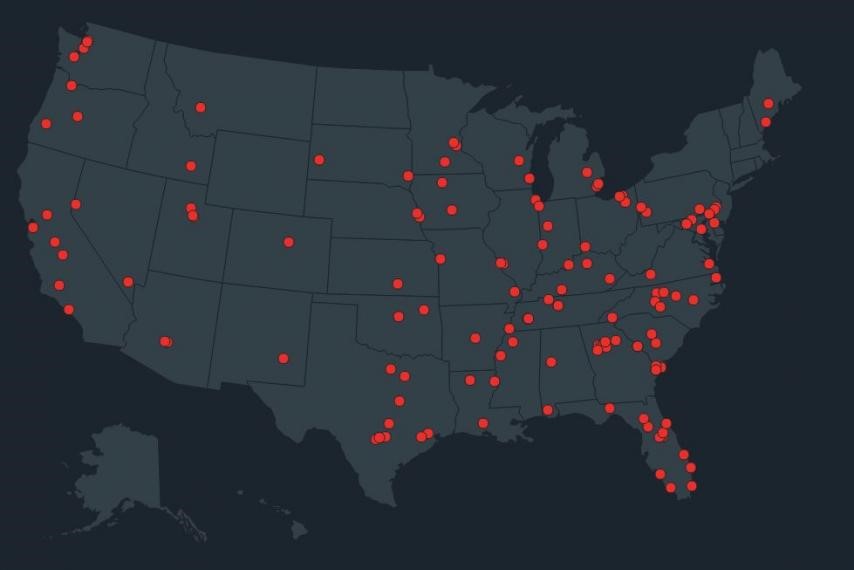Update on the United States
According to Newsweek, there have been 142 school shootings from 2013-Present. Courtesy of Polly Mosendz
March 6, 2018
Many have seen the #savenetnetality trend all over Twitter with petitions trying to keep the net neutrality rules in place. Thousands of Americans voiced their concerns through emails, phone calls and letters to congressman all over America. But on December 14, 2017 the Federal Communications Commission (F.C.C.) voted 3-2 to repeal the net neutrality rules that were installed in 2015 under the Obama administration.
The truth behind net neutrality can get lost in the wilderness of the internet, which leads to the question, what is net neutrality?
According to Dictionary.com net neutrality is “the principle that internet service providers should enable access to all content and applications regardless of the source, and without favoring or blocking particular products or websites.”
Senior Gordon Moody believes that net neutrality makes sure that the internet is an equal playing field. The net neutrality rules ensured that small or upcoming companies can distribute information the same as big media companies. This just means that internet providers such as AT&T and Verizon cannot exclusively promote one content over another. The rules made sure that all content is displayed evenly on the internet.
So what happens now after the repeal?
There have been many misconceptions as to how repealing the net neutrality rules will affect the internet. Well don’t be alarmed, services such as Netflix or Hulu won’t disappear into thin air and the internet is not dead. Companies now may or may not change how customers are billed for services. For example, T-Mobile has been criticized for promoting the “Netflix on us” at no additional charge for customers already subscribed to video service which may put other online streaming companies at a disadvantage. According to CNN, the repeal of net neutrality rules is set to go into effect April 23. As of now net neutrality rules are still repealed, but companies such as Amazon and AT&T have promised to not block any content or favor any particular products.
Another current national discussion is over gun control. To acquire an AR-15, one must be 18 years old and complete a background check including but not limited to; domestic abuse conviction, criminal records and employment history. On the other hand, a certified educator currently employed is required to submit fingerprints and undergo a national criminal history background check. So how is it that teachers are more thoroughly checked than people purchasing a semi-automatic rifle? Also, private sellers in 33 states may sell guns without performing any background checks. It is safe to say that a civilian may purchase a gun 10-40 minutes within entering the store.
According to the Stockton Record, “Wednesday’s shooting (Feb. 14) was the 17th incident of gunfire at an American school this year. Of the 17 incidents, one involved a suicide, two involved active shooters who killed students, two involved people killed in arguments and three involved people who were shot but survived. Nine involved no injuries at all.”
When asked if there should be stricter gun control, senior Sydney Feinstein says, “Its come to a point where people are abusing it [second amendment] and it’s a little bit out of control and I think there needs to be restrictions… just because it’s our amendment right doesn’t mean you can just abuse that power.” Since the school shooting in Parkland, Florida more than 70,442 students plan to participate in the “National High School student walk out” on April 20, the 19th anniversary of the Columbine shooting.
Will there be stricter gun laws?
According to Vox News, when asked about what Congress can get done on gun control legislation, Senator Ben Cardin (D-MD) said “I’m outraged. You’ve got to do more than say that our prayers are with the victims and their families — and they are — but you need to have action. The American people expect action. There’s no excuse why the majority leader hasn’t brought up for a vote the bump stock issues or assault weapons or background checks or large-capacity magazines. All those issues, there’s just no excuse why we haven’t had votes on the floor of the Congress.” When asked if there’s anything congress can do to tighten gun laws, Roy Blunt (R-MO) said, “I don’t think we would know yet; it appears that the gun laws that you would assume should be in place were in place and complied with. Clearly, there’s a lack of people sharing information that they have about unstable individuals, and I don’t know what you do about that, whether it’s terrorists or just people intent on doing bad things. But you can’t continue to let people say they’re going to do bad things and not tell anybody.”
AP Government teacher, Mr. Brandon Castor, shared his own thoughts on gun control. “Definitely raising the (age) limit to 21 would be a start.” Just so happens President Donald Trump encouraged lawmakers last Wednesday (Feb. 28) to pass an inclusive bill that would raise the age limit to 21 and enforcing stricter background checks.

